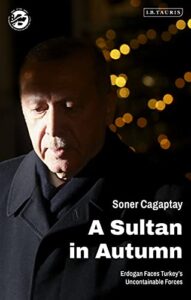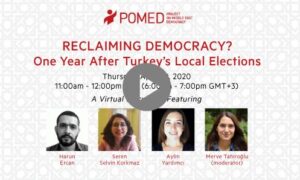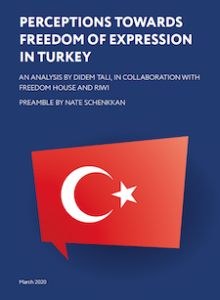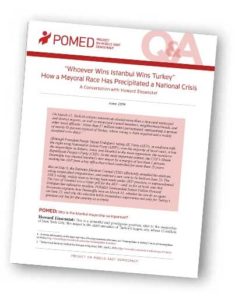 Turkish President Recep Tayyip Erdogan’s authoritarian populism has lost its magic, notes Soner Cagaptay, a Senior Fellow at the Washington Institute for Near East Policy and the author of A Sultan in Autumn: Erdogan Faces Turkey’s Uncontainable Forces.
Turkish President Recep Tayyip Erdogan’s authoritarian populism has lost its magic, notes Soner Cagaptay, a Senior Fellow at the Washington Institute for Near East Policy and the author of A Sultan in Autumn: Erdogan Faces Turkey’s Uncontainable Forces.
Since the 2016 coup attempt, his government has become increasingly paranoid, going after not only suspected coup plotters but also members of the democratic opposition and subsequently arresting tens of thousands of people and forcing more than 150,000 academics, journalists, and others out of their jobs on suspicion of ties to the coup or simply for standing up to Erdogan. And his growing willingness to meddle in elections—including a bungled effort to reverse the outcome of Istanbul’s 2019 mayoral election—has galvanized the opposition. In 2017, however, Erdogan made a fateful mistake, he writes for Foreign Affairs:
He succeeded in ramming through a constitutional amendment that switched Turkey’s political system from a parliamentary democracy to an executive presidential one. In addition to abolishing the office of prime minister, the amendment gave Erdogan more direct control of the state bureaucracy and significantly weakened the powers of the legislature. In effect, Erdogan crowned himself as Turkey’s new sultan—simultaneously becoming the head of state, head of government, head of the ruling party, and head of the police (which is a national force in Turkey).
Yet even as it gave Erdogan more power, the constitutional reform inadvertently strengthened the opposition. Under the parliamentary system, elections were fought among all the parties at once, giving the AKP a natural advantage over its multiple rivals. But the new presidential system requires a runoff between the two leading candidates. This means that the leading opposition candidate now has the ability to bring together a broad anti-Erdogan coalition under one banner.
 Present-day Turkey is defined by its deteriorating rule-of-law architecture and assertive foreign policy, say analysts Marc Pierini and Francesco Siccardi. Looking at the next round of presidential and legislative elections in 2023, Turkey’s Western partners will be faced with three theoretical scenarios: “more of the same,” “end of an era,” or “the surprise scenario(s).” Western policymakers must be prepared for each possibility, they write for Carnegie Europe:
Present-day Turkey is defined by its deteriorating rule-of-law architecture and assertive foreign policy, say analysts Marc Pierini and Francesco Siccardi. Looking at the next round of presidential and legislative elections in 2023, Turkey’s Western partners will be faced with three theoretical scenarios: “more of the same,” “end of an era,” or “the surprise scenario(s).” Western policymakers must be prepared for each possibility, they write for Carnegie Europe:
MORE OF THE SAME: Despite a recent summary of polls that give the opposition a generous lead, sources close to the incumbent president consider an Erdoğan/AKP win a strong probability—if only because the stakes for the president are so high. A third election victory, the second as executive president, would be the crown jewel of Erdoğan’s exceptionally long career in Turkish politics and would solidify his preference for centralized authority, democracy by the ballot box without checks and balances, frequent religious references in public policies, and assertive foreign policy….
END OF AN ERA: ….Some analysts have predicted that “the Erdoğan era . . . is ending”. Supposedly, this scenario would herald an end to Ankara’s disruptive policies implemented in recent years. The tone of a new regime is likely to be more moderate. But it would be hazardous to bet on a complete reversal of current policies, let alone on a clear break with Russia, for the simple reason that the underlying factors of these policies would still be in place: anti-Western feelings will remain, and Russia will not accept an erosion of its strategic gains enshrined in multiple agreements with Turkey simply by the ushering in of a new administration.
 THE SURPRISE SCENARIO(S): Given the tensions on today’s political scene and the fears associated with a loss of power by Erdoğan, it is not impossible that a number of unexpected developments could take place:
THE SURPRISE SCENARIO(S): Given the tensions on today’s political scene and the fears associated with a loss of power by Erdoğan, it is not impossible that a number of unexpected developments could take place:
- One could be a postponement of the elections by a few months to allow the incumbent president to chair the centennial celebrations, although current legislation doesn’t allow for postponement unless the country is at war…
- The tense domestic political debate could also end in a breakup between the AKP and the MHP, leaving the former with around 30 percent of votes, according to current polls, and making impossible an Erdoğan victory in the presidential election.
- Finally, a more mundane scenario would see a neck-and-neck presidential race result in a litigation before the Supreme Election Council, itself ending in a cancellation and an election rerun in short succession as a last-ditch effort to boost the incumbent’s chances of winning.
Erdoğan “openly defies global human rights institutions like the Council of Europe and flatly rejects calls from allies like the United States to restore the rule of law and return to a path of democratization,” according to a statement on “Supporting Democracy and Human Rights in Turkey,” from the Project on Middle East Democracy (POMED), a partner of the National Endowment for Democracy (NED).
 The continued arrests of Turkish businessman and philanthropist Osman Kavala and Kurdish politician Selahattin Demirtaş are “straining Turkey’s relationship with the Council of Europe”, said POMED analyst Merve Tahiroğlu.
The continued arrests of Turkish businessman and philanthropist Osman Kavala and Kurdish politician Selahattin Demirtaş are “straining Turkey’s relationship with the Council of Europe”, said POMED analyst Merve Tahiroğlu.
An attack by Erdogan’s AKP on the national election system would be unprecedented, WINEP’s Cagaptay adds. Yet it seems plausible for Erdogan, given his previous willingness to undermine democratic institutions in Turkey, the nature of his current inner circle, and his determination to hold on to power. RTWT







